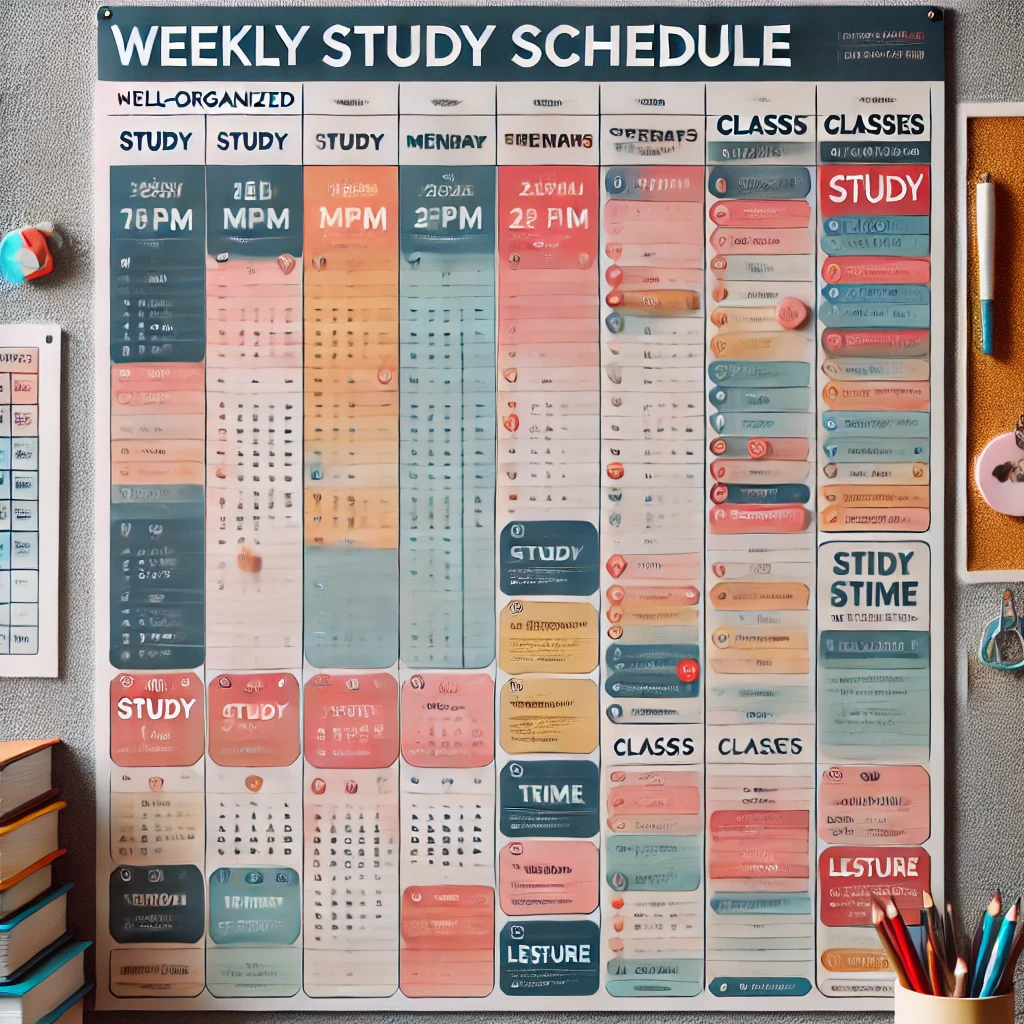To guarantee academic success you need to create an efficient study schedule. It is not only allocating hours for reading.
It’s about managing time wisely, avoiding stress and keeping life balanced. Below are tips on creating one:
1. Know Your Present Timetable
Before starting a new plan of study, familiarize yourself with the old one. Look at things like fixed lessons, work or co-curricular activities that you must attend to.
This will enable you know when exactly free periods for studying show up.
Example Table: Weekly Commitments
| Day | Classes | Work | Extracurricular Activities | Available Study Time |
|---|---|---|---|---|
| Monday | 9am-11am | 1pm-5pm | Soccer 6pm-8pm | 11am-1pm, 8pm-10pm |
| Tuesday | 10am-12pm | Music Class 3pm-5pm | 12pm-3pm, 5pm-9pm | |
| Wednesday | 9am-11am | 2pm-6pm | 11am-2pm, 6pm-10pm | |
| Thursday | 10am-12pm | Drama Club 4pm-6pm | 12pm-4pm, 6pm-9pm | |
| Friday | 9am-11am | 1pm-5pm | 11am-1pm, 5pm-10pm | |
| Saturday | 10am-4pm | |||
| Sunday | Family Time 2pm-5pm | 10am-2pm, 5pm-8pm |

2. Establish Specific Objectives
Clarify the aims of your study sessions. Avoid general goals such as “study math” and be more precise: “finish two chapters of algebra and solve five practice problems.”
This will help you maintain concentration and track your progress.
3. Arrange Your Subjects in Order of Importance
Give more time to subjects that are difficult for you. If you struggle with mathematics, set aside more sessions for it than for topics you are good at.
Example Table: Subject Prioritization
| Subject | Current Grade | Study Hours per Week |
|---|---|---|
| Mathematics | C | 5 hours |
| English | B | 3 hours |
| History | A | 2 hours |
| Science | B+ | 4 hours |
4. Make a Weekly Overview
It is crucial to plan your week beforehand. Divide the time into manageable chunks, and include meals, breaks, and leisure activities as well. A good schedule should be holistic such that it keeps you stable while preventing burnout at the same time.

Example Table: Weekly Study Schedule
| Time Slot | Monday | Tuesday | Wednesday | Thursday | Friday | Saturday | Sunday |
|---|---|---|---|---|---|---|---|
| 9am-10am | Class | Class | Class | Class | Class | Study | Study |
| 10am-11am | Class | Study | Class | Class | Class | Study | Study |
| 11am-12pm | Study | Study | Study | Study | Study | Study | Study |
| 12pm-1pm | Lunch Break | Study | Study | Study | Study | Lunch Break | Lunch Break |
| 1pm-2pm | Work | Study | Study | Study | Work | Study | Family Time |
| 2pm-3pm | Work | Music Class | Study | Study | Work | Study | Family Time |
| 3pm-4pm | Work | Music Class | Study | Drama Club | Work | Study | Study |
| 4pm-5pm | Work | Dinner Break | Dinner Break | Drama Club | Work | Study | Study |
| 5pm-6pm | Dinner Break | Study | Study | Dinner Break | Dinner Break | Study | Study |
| 6pm-7pm | Soccer | Study | Study | Drama Club | Study | Leisure | Study |
| 7pm-8pm | Soccer | Study | Study | Study | Study | Leisure | Study |
| 8pm-9pm | Study | Study | Study | Study | Study | Leisure | Study |
| 9pm-10pm | Study | Study | Study | Study | Study | Leisure | Study |
5. Integrate Rest Periods
It is important to take breaks. One can apply strategies such as the Pomodoro Technique where one concentrates for twenty-five minutes then takes a five minute break. This helps in maintaining mental alertness and avoiding weariness.
Pomodoro Technique Breakdown
| Pomodoro Cycle | Activity | Duration |
|---|---|---|
| 1st Pomodoro | Focused Study | 25 minutes |
| 1st Break | Short Break | 5 minutes |
| 2nd Pomodoro | Focused Study | 25 minutes |
| 2nd Break | Short Break | 5 minutes |
| 3rd Pomodoro | Focused Study | 25 minutes |
| 3rd Break | Short Break | 5 minutes |
| 4th Pomodoro | Focused Study | 25 minutes |
| Long Break | Long Break | 15-30 min |

6. Embrace Time Blocking
Time blocking is an effective strategy for managing tasks by allocating fixed amounts of time to them. This technique helps minimize interruptions and boosts concentration. Set aside blocks for studying, going to class, and other activities you enjoy doing.
10 Surefire Methods of Studying for Success in School in 2024
Example Table: Time Blocking
| Time Block | Activity | Details |
|---|---|---|
| 9am-11am | Study Block | Mathematics |
| 11am-12pm | Break | Lunch and Relax |
| 12pm-2pm | Study Block | Science |
| 2pm-4pm | Class | History Lecture |
| 4pm-6pm | Study Block | English Literature |
| 6pm-7pm | Break | Dinner |
| 7pm-9pm | Study Block | Review and Practice |
7. Use Technology
Keep your schedule on apps and tools. Apps such as Google Calendar, Trello, or even My Study Life can come in handy when you need organization or reminders about studying.
8.Active Learning Strategies
Don’t just sit there and expect knowledge to fly into your brain; actively engage with study material. Summarize notes using different words than the ones they were written in, teach a concept to someone else, or discuss information with peers. Doing so will help solidify what is learned and improve retention.
9. Stay Flexible
It’s important to remain flexible because life happens. Sometimes things come up that require us to shift around our time so we can still meet everything we planned for ourselves.
If not more! This can be done by building extra time into one’s day (or semester) between commitments made already knowing full well those won’t always suffice as expected but also leave room open enough where anything could fit if necessary.
10. Track Your Progress
Using a planner or keeping some kind of study journal are great ways to track how much has been accomplished over time; along with this reflection should occur about what worked/didn’t work which allows for adjustments being made if needed.

Always striving towards bettering oneself through continuous improvement!
How to Choose the Right College for You in 2024
11. Balance And Self-Care
One must take care of themselves while studying too hard not forgetting about sleep eating healthy exercise etc…
All these things are vital parts of maintaining overall wellness while striving for success; without them burnout becomes inevitable sooner than later
